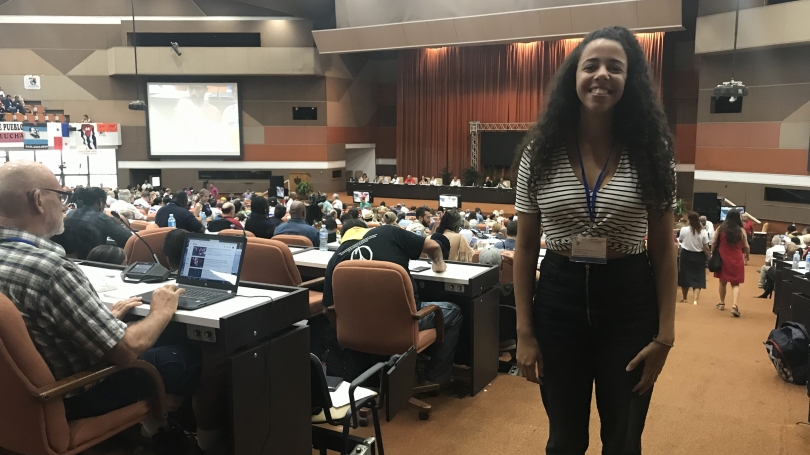
- Public Policy
- Leadership
- Funding
- News & Events
- About the Center
Back to Top Nav
Back to Top Nav
Back to Top Nav
Back to Top Nav
Juliana Bastos de Mello '22 attended the Jornada Continental por la Democracia y Contra el Neoliberalismo, while in Cuba.
As a Latin American student from Brazil I was looking forward to meeting with leaders in social and political movements all over the continent whose actions have an active role in the sociopolitical innovations, challenges and requests of the region. For instance, I was thrilled to meet the president of the Partido dos Trabalhadores (PT) – the worker’s party – in Brazil, Gleisi Hoffmann, as well as the former president of Paraguay, Fernando Lugo, who was the victim of a coup in 2012.
Having the opportunity to meet and talk with both of them was an unforgettable experience as was the other prominent figures that were present, nevertheless the most meaningful learning experience I had in this conference was the opportunity to discuss with grassroots activists from all over the region whose organizations are greatly impacting life in the region, as well as those from north America. For instance, I learned immensely from dining with the Puerto Rican commission and hearing what they have to say about the recent political events in the country.
Additionally, it was incredibly meaningful to talk with Native American activists with whom I got to discuss Indigenous people’s rights in the United States. Moreover, I got to meet some of the American students at ELAM, (Escuela Latinoamericana de Medicina – Latin American School of Medicine) where diverse backgrounds can be found since the program is geared towards low-income outstanding students. Through these future doctors I got to discuss the benefits of a possible alliance between Cuba and the United States, for instance the vast medical knowledge of Cuba, a possible alliance against drug trafficking and the effect of climate change such as the increasing occurrence of hurricanes which affects both countries. The United States and Cuba have more points of alliance in the case of future friendly relations than of divergence, policies that focus on the points of convergence would bring mutual benefits.
Having these shared advantages of international alliance in mind, the delegations got to discuss active measures for the benefit of the continent considering its common challenges. For instance, the influence of American imperialism on the continent was mentioned multiple times and so was the need to fight it. One of the proposed solutions to such problem was the incentive to cooperation and integration among the nations of the continent, as in, for example, organizing meetings between activists from the region on a regular basis. In doing so, it is believed that the exchange of culture and activism tactics and focuses will enhance the fight for social justice. In a region dominated by political turmoil with shared characters it is of the highest importance to encourage dialogue among the groups attempting to achieve social change. Participating in the Jornada Antiimperialista offered me a space to discuss and learn about some of the challenges that the continent now faces, and creative ways to fight them.
-Submitted by Juliana Bastos de Mello '22, Rockefeller Center Mini Grant Recipient
The Rockefeller Center's Mini-Grants program funds registration fees for students attending conferences, as well as the costs of bringing guest speakers to Dartmouth. The views and opinions expressed here are the author’s own and do not necessarily represent the views and opinions of the Rockefeller Center or constitute an endorsement by the Center.